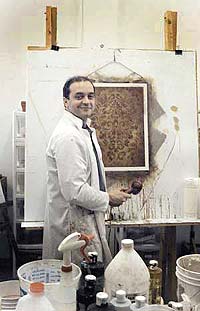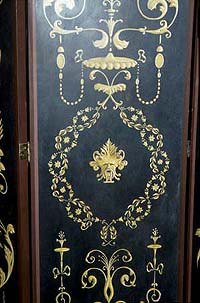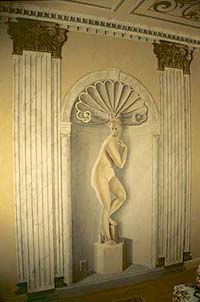
Nicola Vigini, San Antonio, Texas
As a young man, Nicola Vigini would walk through the streets and buildings of his native Rome, totally oblivious to the "hidden" art surrounding him.
By Joan C. Stanus
did he truly see the vast amount of age-old decorative art on the walls, ceilings and floors of the structures he passed daily. Creating that art soon became his passion, his vocation and, eventually, his claim to fame.
Now one of the most prominent and respected decorative artists in the world, Vigini has created a thriving industry out of his calling. A sought-after faux finisher as well as teacher, he has transformed religious institutions, exclusive residences, private yachts, airplanes, large commercial spaces and museums with his work. He and wife, Leslie, also operate a world-renowned school for faux finishing in San Antonio, Texas, where his studio is located. Hundreds of artisans and teachers from throughout the world come to his school each year for dozens of workshops on a wealth of topics, from classic and innovative faux-finishing techniques to developing business plans. The Viginis are also the Texas distributors for the Faux Effects finishing system. This year, their studio received a coup when it hosted Salon 2002, an annual meeting for the International Conference of Decorative Artists organization. While in San Antonio, some 150 artists from 14 countries around the world held workshops and painted publicly.  Hosting the prestigious group was the "pinnacle of my career," says Vigini. "It was very exciting and says a lot about our reputation that they came here." Hosting the prestigious group was the "pinnacle of my career," says Vigini. "It was very exciting and says a lot about our reputation that they came here."
He's had a career with plenty of highs, however. Vigini originally considered pursing a career in fine arts. But it didn't take him long to realize that making enough money to support himself and a family would be difficult. After receiving classical training at the Liceo Artistico in Rome and Institute Superieure de Peintre Decorative in Paris, he fell into the faux-finishing field "almost by chance." "I wanted to make a living in art, but I didn't want to be the classic starving artist or to work at night after my job all day," he says. "Getting into (decorative arts) was the best of both worlds. It was a way to make a living with the skills I had." In the early 1980s, when Vigini entered the field, it was just starting to blossom. After relocating to Seattle to be with his American-born first wife, he began taking commissions and soon developed a reputation for his artistic skills. Before long, he had more work than he could handle. "I was at the perfect age at the perfect time," recalls the artist, now 43. "I saw the possibilities as a paint contractor to make more money and as an artist to make more profit using the skills I had." Now, faux finishing and other decorative arts are almost all people want in their homes and businesses, Vigini says.  Although Nicola shows great talent as an artist, many decorative painting finishes are taught in his classes at Vigini Studios. Although Nicola shows great talent as an artist, many decorative painting finishes are taught in his classes at Vigini Studios.
"It's just been incredible," he says. "The faux market is really experiencing a renaissance, even though most of the techniques are 2,000 years old. I expect it to continue, too. Every year, people want something in their homes that is new and exciting... something that will make their home distinctive. Going back to flat color is not going to do it." In today's business, however, he classifies the most popular finishing techniques under one broad category -- "the Old World look." "People want their homes or businesses to have an old look rather than like they've been freshly painted," he said. "That includes creating looks that imitate many natural products. It has a lot of appeal to today's homeowners."  Consequently, Vigini's workshops include the use of the modern Faux Effects products as well as traditional mediums such as acrylic, beer, and oil glazes. In addition to wall finishing techniques, advanced subjects include faux marble, wood graining, murals and frescos, trompe l'oeil and grottesca. Guest instructors from around the world come to the San Antonio studio each year to teach many of these traditional European techniques. Consequently, Vigini's workshops include the use of the modern Faux Effects products as well as traditional mediums such as acrylic, beer, and oil glazes. In addition to wall finishing techniques, advanced subjects include faux marble, wood graining, murals and frescos, trompe l'oeil and grottesca. Guest instructors from around the world come to the San Antonio studio each year to teach many of these traditional European techniques.
Although he sees his work as "part science," first and foremost, Vigini considers himself an artist. "To do this well, you really have to be an artist," he says. "But people don't realize that this is a serious profession with a lot of levels and you do need professional training. Number one is you need to learn how to do it, and then you can decide how far with it you want to go." That's the lesson he'd like to pass on to those thinking of offering faux finishing in their businesses: secure training to avoid pitfalls and call-backs. Without training, "You may get by, but eventually you're going to run into trouble because your work is going to be rejected," he says. "You also need professional products. You can't just run down to The Home Depot and get what's on the shelf and expect to do a professional job."  He recalls too many jobs where his team of craftsman has had to come behind someone else to redo the work. He recalls too many jobs where his team of craftsman has had to come behind someone else to redo the work.
"I've seen lots of nightmares," he says. For Vigini, the most challenging aspect of developing his business, however, has not been in perfecting technique, assembling the sky-high scaffolding often necessary or securing work. It has been in acquiring management skills to run a professional business. "It was a lot of trial and error," he now admits. "Business wasn't something they taught you in France. I had to learn how to price, to deal with clients, draw up a contract. It was one of the biggest challenges of my career." Today, he stresses that it was worth the headaches. He now feels lucky to have landed in a career tailored perfectly for him. "This is a fantastic career for someone like me," he says. "If someone has artistic talent and wants an economically rewarding career, this is something they should really consider." 
|

